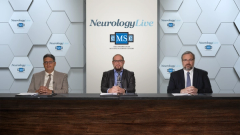
BTKi Safety Considerations in Multiple Sclerosis
Experts in neurology discuss safety concerns and considerations with the use of BTKis in the management of patients with multiple sclerosis.
Episodes in this series

Ahmed Obeidat, MD, PhD: From a safety perspective, both of you talked about safety and about off-target effects. Now, can you assume that the safety if one molecule is going also translate to the safety or like the safety of another molecule, or that also is going to be distinct. That's another thing.
Hesham Abboud, MD: They are very different and, for example something like tolebrutinib, it provides irreversible inhibition of BTKi compared to fenebrutinib for example, is a reversible inhibitor. And if you are dealing with a reversible inhibitor, you expect a safety profile that is more favorable. The same for selectivity, for evobrutinib for example, is more selective despite being less potent, the safety would be much better since it's more selective to BTKi and less activity against other Kinases.
Ahmed Obeidat, MD, PhD: Dr Greenberg, what do you think about this? Do you think the safety would also be different?
Benjamin Greenberg, MD: It's going to be incredibly different. And we must look to our colleagues in oncology. They now have 3 FDA approved Bruton's Tyrosine Kinase inhibitors. None of those are being studied in MS yet. They are being used in oncology. One was the first-generation drugs and then there were 2 second-generation drugs. And if you look to their experience, the safety profile was quite different drug to drug. There were some drugs that were associated with unique infection profiles. Early on they saw some patients, not all, with aspergillus infections. And then in others, it didn't pop up. If we pay attention to their experience and then track these patients carefully, we're going to learn that you can't translate from one to the other. There will be a foundation of risk that's probably true across the board.
Ahmed Obeidat, MD, PhD: A class effect.
Benjamin Greenberg, MD: Some version of the class effect, but then they'll be unique profiles. The closest we come to this right now in our practice is maybe the S1P drugs where there are some unique differences and what the risk of macular edema seems to be slightly different between the drugs or may be different between the drugs. First dose issues may be different between the drugs. That's the closest we've gotten so far in MS clinical care. In BTK inhibitors, it's going to be a much bigger issue in terms of separating these into individual drugs.
Ahmed Obeidat, MD, PhD: And Dr Abboud, if we also stay with the safety here and mention something about bleeding. That's one of the risks that was seen in oncology and to my understanding maybe it's less expected to be seen in MS trials, but we still don't know. What's your take on that risk?
Hesham Abboud, MD: The bleeding risk is one of the most concerning adverse effects that we have with this class, and they seem to act on platelets directly. But as you mentioned, most of the bleeding risk was seen in leukemia at clinical trials and those are patients who are already at risk for bleeding anyway. In MS clinical trials so far, this risk hasn't been at the same magnitude, but it's something that we still worry about. We worry about immune-mediated thrombocytopenia in MS patients because they have increased risk of other autoimmune disorders and how will can affect or end. It's something I guess that looking at the results of the ongoing of history clinical trials, it will be very interesting to see if these medications are truly safer in MS patients compared to leukemia patients form that standpoint like what we saw in the phase II trials, I guess we'll wait and see.
Benjamin Greenberg, MD: And I must, at this point, make a plug based on this discussion of risk for us educating ourselves and our colleagues educating themselves on the basic biology because unless you really dive into how these kinases work, it wouldn't make sense. Why would there be a bleeding risk by treating an autoimmune disease? And it goes back to modulating these kinases and the on and off target effects. Platelets, which are derived from the same primogeniture cell as microglial. They start with the same primogeniture cell use various kinases related to BTK in their activation. And if you inhibit the kinase, it might be good for an MS patient to inhibit BTK in a microglial cell. We're to inhibit it in a B cell, but you want it functioning in a platelet.
Ahmed Obeidat, MD, PhD: Yes, that's right.
Benjamin Greenberg, MD: And those off target effects are where we see some these adverse effect issues and what's going to be fascinating about these drugs is categorizing the risks into those 2 camps. What is coming from an off-target effect and what is tied to the efficacy of the drug. When I'm discussing these different drug classifications with my patients, immunomodulation, immunosuppression, immune remodeling. What I've said for years is in MS efficacy is tied to risk. As you move across the spectrum to higher efficacy drugs, you acquire risk and that risk, at least in our clinic that we've watched for the most are infectious complications of immunosuppression or immune remodeling. This is going to be different for those off target effects. The efficacy and the risk could be separate from each other. But on the B-cell modulation there is going to be that link. The more we inhibit B cells presumably, presumably, that's where the infection risk is going to come in. If B-cell depletion is the ultimate of B-cell inhibition, it's going to be interesting to see how this cellular modulation translates into infectious risk or not. Can we get away with some inhibition without seeing opportunistic infections for those types of things.
Ahmed Obeidat, MD, PhD: That's a great point where you classify the risk into either directly related to the effect of the medicine on the B cells or these of target effects, which to your point, if we think about the B-cell depleting therapies, in general, like anti-CD20s, they're more targeted they don't have that off target effect as much. But their concerns of safety come from their effect and efficacy, I like this kind of analogy. It resonates very well with us and with our audience.
Transcript Edited for Clarity
Newsletter
Keep your finger on the pulse of neurology—subscribe to NeurologyLive for expert interviews, new data, and breakthrough treatment updates.














